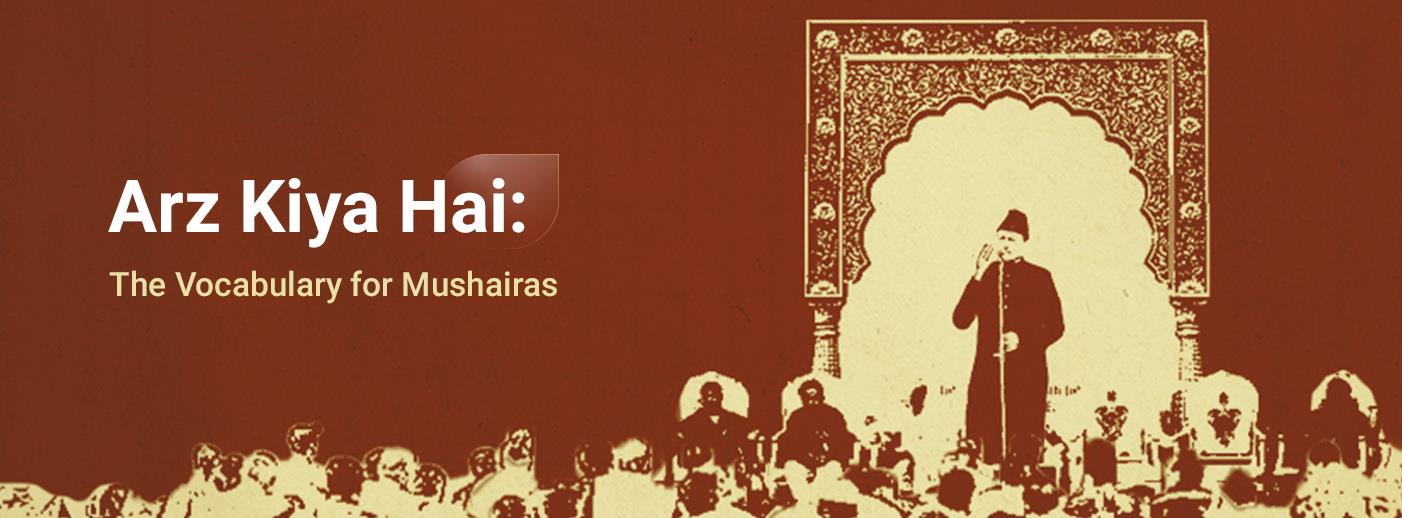زیادہ تلاش کیے گئے الفاظ
محفوظ شدہ الفاظ
کِھسیانی بِلّی کَھمبا نوچے
جسے غصہ آرہا ہو وہ دوسروں پر اپنی جھلاہٹ اتارتا ہے، بے بسی میں آدمی دوسروں پر غصہ اتارتا ہے، شرمندہ شخص دوسروں پر اپنی شرمندگی اتارتا ہے، کمزور کی جھنجھلاہٹ
چَمَنِسْتان
ایسا باغ جہاں پھول کثرت سے ہوں، ایسی جگہ جہاں دور تک پھول ہی پھول اور سبزہ سبزہ نظر آئے، گلزار، گلستان، باغ، پھولوں کا قطعہ، سبز کھیت
Arz Kiya Hai: The Vocabulary for Mushairas

Ah, the world of Mushaa’iras, a haven for all Urdu enthusiasts! If you're a lover of this beautiful language, then Mushaa’iras are undoubtedly the highlight of your calendar. Just a quick glance at Jash-e-Rekhta's social media pages will reveal the sheer frenzy and excitement that surrounds these poetic gatherings.
And why shouldn't we be thrilled? The allure of enchanting ghazals, captivating poems (nazm), and the mesmerizing atmosphere of poetry and verses is simply irresistible.
But amidst all the buzz, what truly captures the attention is the unique vocabulary that permeates these Mushaa’iras. From the elegant invitation of a poet onto the stage to the exquisite appreciation of their compositions, everything is executed with utmost sophistication, respect, and a language that is exclusively reserved for these literary congregations.
So today, my dear readers, we embark on a journey to explore this very vocabulary that thrives in the realm of Mushaa’iras. Let us delve deeper into the world of live ghazal and nazm recitations, and discover the hidden treasures that lie beyond the customary waah-waah.
And here goes the list:
Let us begin with the word ‘shaa'ir’, a familiar term in the world of Urdu literature, which simply means a poet. In the context of Mushaa’iras, the plural form "shu'araa" is frequently used to refer to poets. It is worth noting that moderators and hosts often also use the Hindi term "kavii" to address these talented wordsmiths.
Now, let us turn our attention to the role of a "naazim" or "naazim-e-Mushaa’ira," who serves as the host or moderator of the Mushaa’ira. These individuals, often esteemed poets themselves, have the honor of moderating the Mushaa’ira and inviting the poets onto the stage. The act of moderating a Mushaa’ira is known as ‘nizaamat’.
An exemplary figure in this regard was the late Anwar Jalalpuri, whose interview with Farhat Ehsaas sahab at Rekhta Studio can be watched here.
In the context of a Mushaa’ira, the phrase "in ko daa'vat dete hain" signifies the act of inviting a poet on stage. Typically, a naazim invites a poet by saying something along the lines of "ab hum fulaa.n shayar ko stage pe daa'vat dete hain," which translates to "we'd now like to invite such and such poet on the stage." Alternatively, the naazim may also say "hum fulaa.n shaa.ir ko aavaaz dete hain," conveying the same meaning.
Moving on, we encounter the term "sadr-e-Mushaa’ira," which refers to the head or chief of the group of poets in a Mushaa’ira. Usually, the sadr is the most senior poet among all, and out of courtesy, poets seek permission from them before reciting their work.
Perhaps the most popular phrase on our list today, arz kiyaa hai has made its mark as the classic Mushaa’ira lingo. Poets employ this phrase when they are about to recite a couplet or poem, adding an air of anticipation and charm to their performance.
In the spirit of courtesy, poets usually say ‘aap ki ijaazat ho toh mai kuch sher pesh karuu.n’, meaning ‘if you (the audience and the sadr) permit, I'd like to recite a few couplets, etc.’ To encourage the poet, the naazim and fellow poets usually respond with "irshaad", which literally means a saying or utterance. In the Mushaa’ira setting, it serves as an encouraging gesture, urging the poet to share their poetic creation.
'nazr karnaa' is a an idiom which means to offer or dedicate something to someone. In Mushaa’iras, poets often use phrases like ‘ye sher hum fulaa.n ki nazr karte hain’ indicating that they are dedicating a couplet or part of a nazm to a specific individual, adding a personal touch to their recitation.
Lastly, we cannot overlook the phrase "waah-waah," as it holds great significance in the world of Mushaa’iras. The success of a ghazal is measured by the intensity of waah-waah it receives. "Waah" is an expression of appreciation and serves as the ultimate way to convey your admiration for a captivating couplet.
Other common terms such as "muqarrar," "mehfil," and "kalaam" further enrich the poetic tapestry of this mesmerizing art form.
We hope that you’ve learned a thing or two about the Mushaa’ira culture from this blog. Keep visiting this space because hum aap ki khidmat mein jald hi aur kuch pesh karenge!
Delete 44 saved words?
کیا آپ واقعی ان اندراجات کو حذف کر رہے ہیں؟ انہیں واپس لانا ناممکن ہوگا۔





